Chutima Sidasathian is a highly-regarded Phuketwan journalist who also files for CNN and the South China Morning Post newspaper, as well as other international outlets.
Now, she says, she has been wrongfully blacklisted at the Royal Thai Navy base on Phuket.
''My photograph is in the guardhouse at the entrance to the base, which is now the headquarters on Phuket for the National Council for Peace and Order.
''What it means is that I am banned from attending events being held there quite often that have nothing to do with the Navy.
''My photograph is there for everyone to see. I am being scapegoated and denied the right to do my job. It's an unacceptable form of intimidation,'' she said today.
''The people responsible, or their superior officers, should feel a sense of shame. They should act immediately to remove me from this Navy blacklist.''
She and Phuketwan editor Alan Morison were turned away at the gate of the base recently when they went to cover a media event there. Other Phuket journalists were permitted to enter.
The ban ''is a sign that at least one person in the Navy holds a personal grudge against Phuketwan because of its frequent reporting of the Rohingya boatpeople,'' Morison said today.
''We thought the Royal Thai Navy might also embrace the ideal of fair treatment for all as expressed by the Prime Minister, Prayuth Chan-ocha,'' Morison said today. ''It appears we were wrong.''
The seminar at which Khun Chutima will be a keynote speaker today deals with criminal defamation and the Computer Crimes Act and how these iniquitous laws are being used in Thailand to silence investigative journalists, human rights advocates and activists.
Before the military takeover in Thailand on May 22, the Navy used both criminal defamation and the Computer Crimes Act in a precedent-setting military versus media legal action against Khun Chutima and Morison.
Despite widening international criticism, their trial continues in July next year.
In June this year, the case was mentioned in the US State Department's Trafficking in Persons report that downgraded Thailand to the lowest level. The slow progress of the trial means the case is likely to be referred to again in next year's report.
Journalists around Asia and the world lived in increasing fear of governments using repressive laws to silence critical reporting, Peter Noorlander, chief executive officer of the London-based Media Legal Defence Initiative, told Phuketwan after a visit to Bangkok earlier this month.
There he met with lawyers from Thailand, Pakistan, India, Malaysia and the Philippines to exchange information about ways in which action designed to silence journalists and advocates could best be combatted.
The Media Legal Defence Initiative is funding the cost of Phuketwan's legal team and acting on behalf of journalists in about 100 other cases around the world.
''There is a lack of tolerance and understanding that any true democracy requires open discussion and debate,'' he said. ''A legal system that allows abuses makes life difficult for journalists.''
Criminal defamation was being used more frequently in India and countries in eastern Europe were ''sliding back into old habits,'' he said.
Morison said today that the Royal Thai Navy legal action, over a Reuters paragraph republished in Phuketwan, came as a surprise because the news outlet and the Navy were both based on Phuket.
''We had the utmost respect for the Navy,'' Morison said. ''It's clear that our coverage of the Rohingya boatpeople since we revealed the inhumane pushbacks in 2009 has been closely followed.
''At the time, we defended the Navy from accusations that they were involved in the pushbacks.
''What is now happening to the Rohingya at sea and how so many thousands of them end up in human traffickers' camps in southern Thailand remains a total mystery.
''Rather than keeping its activities secret, the Navy should publicly explain its part in 'helping on' Rohingya. Until there is a thorough explanation, journalists will continue to ask questions.''
The paragraph over which Phuketwan is being sued formed part of a Reuters series on the Rohingya that later won a prestigious Pulitzer prize.
Several Thai news outlets also published the exact same words but only the two Phuketwan journalists have been charged.
*Khun Chutima has accepted an invitation to address journalists from 120 countries at the World Congress and General Assembly of the International Press Institute in Yangon, Burma (Myanmar) from March 27-29 next year.
She also hopes to take up speaking invitations in Australia, Europe and Japan.
United Nations
''Criminal prosecution for defamation has a chilling effect on freedom of the press,'' said Ravina Shamdasani, the spokesperson for the Office of the High Commissioner for Human Rights. ''International standards are clear that imprisonment is never an appropriate penalty for defamation.''
Human Rights Watch
''The Thai navy's lawsuit is a reckless attempt to curtail journalists' reporting on alleged human trafficking by its officers,'' said Brad Adams, Asia director at Human Rights Watch. ''Unless the government withdraws the case, its impact will be felt far beyond those reporting on abuses against the Rohingya - and could have a choking effect on all investigative reporting in Thailand.''
Reporters Without Borders
"It is intolerable that journalists are being prosecuted for just doing their job by relaying information of general interest that had already been made public," Reporters Without Borders said. "Bringing charges under the controversial Computers Crimes Act in a defamation case is indicative of the critical state of freedom of information in Thailand and amounts to an attempt to gag the media. We support these journalists, who are facing a jail term, and we call for the immediate withdrawal of these proceedings."
Committee to Protect Journalists
''Rather than shooting the messenger, the Royal Thai Navy would be better suited launching an internal investigation into the serious allegations of abuse that have been raised,'' said Shawn Crispin, CPJ's senior Southeast Asia representative. ''This type of legal intimidation aims ultimately at discouraging media reporting on allegations of serious human rights abuses.''
Chris Lewa, director of the rights group the Arakan Project
''Thanks to the fair investigative reporting by the Phuketwan journalists, the involvement of various Thai agencies in the massive smuggling and trafficking operations of Rohingya refugees and their related miseries is no more a secret. Rights groups should unite to call on Thailand to quash these defamation charges.''
Phuketwan
''We wish the Royal Thai Navy would clear its reputation by explaining precisely what is happening to the Rohingya in the Andaman Sea and in Thailand,'' Phuketwan said in a statement released in response to the charges. ''By instead using a controversial law against us, the Navy is, we believe, acting out of character.''
Bangkok Post
The action makes the navy look like a bully, and gives the impression the admirals would like to intimidate the media. Instead of defending the navy's honor, the criminal defamation suit holds it to question. Instead of silencing the media about the story - concerning the navy's role in the mistreatment of Rohingya boatpeople - the lawsuit repeats it, to more people and at greater length.
CNN
Morison said: "The navy's action over one paragraph has created a perfect storm. If the navy proceeds with the case, the Rohingya issue is now tied up in their action against media under a controversial
law."
TIME
In the meantime, calmer seas mean that even more Rohingya are expected to attempt the treacherous journey in the weeks ahead. Nothing could gladden the traffickers more.
Reuters
Barb Burg, Reuters' (former) global head of communications: ''Our story was fair and balanced and Reuters has not been accused of criminal libel.''
Bill Barnett (The Phuket Insider)
The issues which have drawn Phuketwan into this fray are profound and disturbing. There should be no need to wax over reality and respect needs to be given to those who stand up for the helpless who cannot help themselves.
Andrew Drummond (Investigative Journalist)
We should all support journalists who are doing a difficult job here
under laws which best suit a totalitarian state.
Excellence in Human Rights Reporting, Investigative Reporting awards
In 2010 the Phuketwan team shared the Society of Publishers in Asia Award for Excellence in Investigative Reporting and a second Award for Excellence in Human Rights Reporting, both with the South China Morning Post newspaper. Judges said of the Excellence in Investigative Reporting award: ''An excellent series that uncovered serious government abuses and had a material impact in correcting them. Exclusivity. Strong reporting. Hard-hitting piece with international implications.''
Of the Excellence in Human Rights Reporting award, the judges said: ''Excellent investigative work that exposed serious human rights abuses of oppressed people. Intrepid reporting of a hidden subject. This is a high-caliber series buttressed by solid on-the-ground reporting and great pictures. All militaries are challenging subjects for investigative reporters and Thailand's is no exception. The team clearly went to great lengths to get sources, break news, and provide the details that prodded the government into action.''

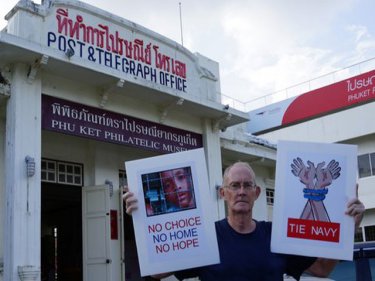

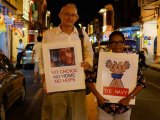
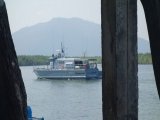



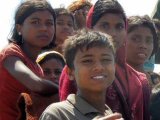
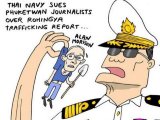
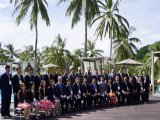
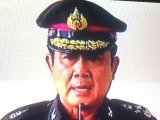


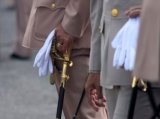

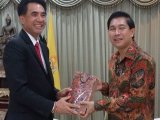
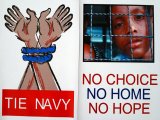
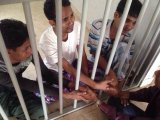



It would be a fair statement to make that true democracy cannot exist without complete freedom of speech, restrictions or laws that limit the ability to have or publish an opinion without the threat of prosecution.
Posted by Manowar on September 24, 2014 09:44
Editor Comment:
There is no such thing as complete freedom of speech but most democracies do not have criminal defamation laws. They have civil defamation laws. For the military to sue the media is unprecedented in Thailand. It wouldn't be possible in most real democracies.